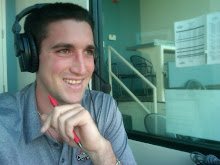Varitek is best known for his preparation for every game. He holds almost every single catching record for the Red Sox as well as two additional Major League Baseball records: most no hitters caught (four) and most postseason home runs hit by a catcher (eleven). Varitek was serviceable on offense (.256 BA, .341 OBP, .435 SLG, and averaging 20 HRs and 79 RBI over a 162 game season), but he really stepped up his game when the game was on the line.
The eleven post-season home runs is the first thing that comes to mind when talking about Captain Clutch, but it was ability to do all of the little (and fundamental) things while at the dish that gave Varitek is clutch reputation.
When I first learned of Varitek's decision to retire I did not think the big boys at ESPN would make a fuss about it, but I was wrong. I assumed because Varitek, despite his accolades, did not produce the type of numbers associated with the Hall of Fame that ESPN would gloss over his retirement. However, ESPN, noticing how rare it is in today's game for a player to remain with the same team he played his first major league game for, decided to go the extra mile in publicizing his retirement.
ESPN ran a special segment for his retirement announcement as well as several screen graphics about his time with the Red Sox. The announcement of his retirement was also prominently displayed on the main ESPN website as well as the fringe ESPNBoston.
Therefore, the sports audience was greeted with statistics about Varitek like his eleven post season runs as well as his record breaking no-hitters caught statistics, but while discussing what he meant to the organization, they played the same several clips in a loop. The one that should stand out, but is probably overlooked is not the classic looping and slow swing (one of the reasons for his forced retirement, but should also stand as a testament of how much of an overachiever he was considering he had a swing destined to fail) that produced 193 home runs, but one of him against the Yankees, batting from the left side and slapping the ball down the third base line.
The play occurred last season, in the waning innings of a pivotal game against the Yankees. The game went back and forth, momentum swing after momentum swing, and then stepped in Varitek with a man on first base. Varitek, having an average year at best, stepped up to the plate, but these were the times throughout his career where he always came through. If the Red Sox needed a double, they got it, if they needed a home run, he blasted one over the Green Monster, or if they needed a sacrifice bunt, he would do that too, with no questions asked.
On this particular at-bat Varitek was called to executive a hit and run. Sometimes, when a player is not swinging the bat all that well a manager will call for the hit and run in hopes that it will do two things for the ailing batter: speed up his bat and also force him to simply concentrate on making contact with the ball (in other words, not do to much at the plate, just enough to help out the team).
In comes the pitch and it is a beautiful curveball, Varitek is absolutely fooled; his knees buckle and he lurches all of his weight onto his front foot, but amazingly Varitek connects with the ball. The Captain, despite committing almost every batting sin remembered the most important rule; keep the hands back. With his entire body going in one direction, he had enough wherewithal, on a pitch and situation where most batters simply give up, to keep his hands back, reach down and slap the ball, about a foot off of the ground, down the third base line.
The runner came around to score and the Red Sox took the game. Few will remember the play. Most will remember Varitek shoving his glove in the face of Alex Rodriguez, inciting the 2004 brawl. Most will forget he did that to protect his pitcher, Bronson Arroyo. But if you remember nothing else about Varitek's career it will be that everything he did was to help out his team and his teammates, and that is why he will go down as the most loved catcher in Red Sox history, and for that, Captain, we thank you.
